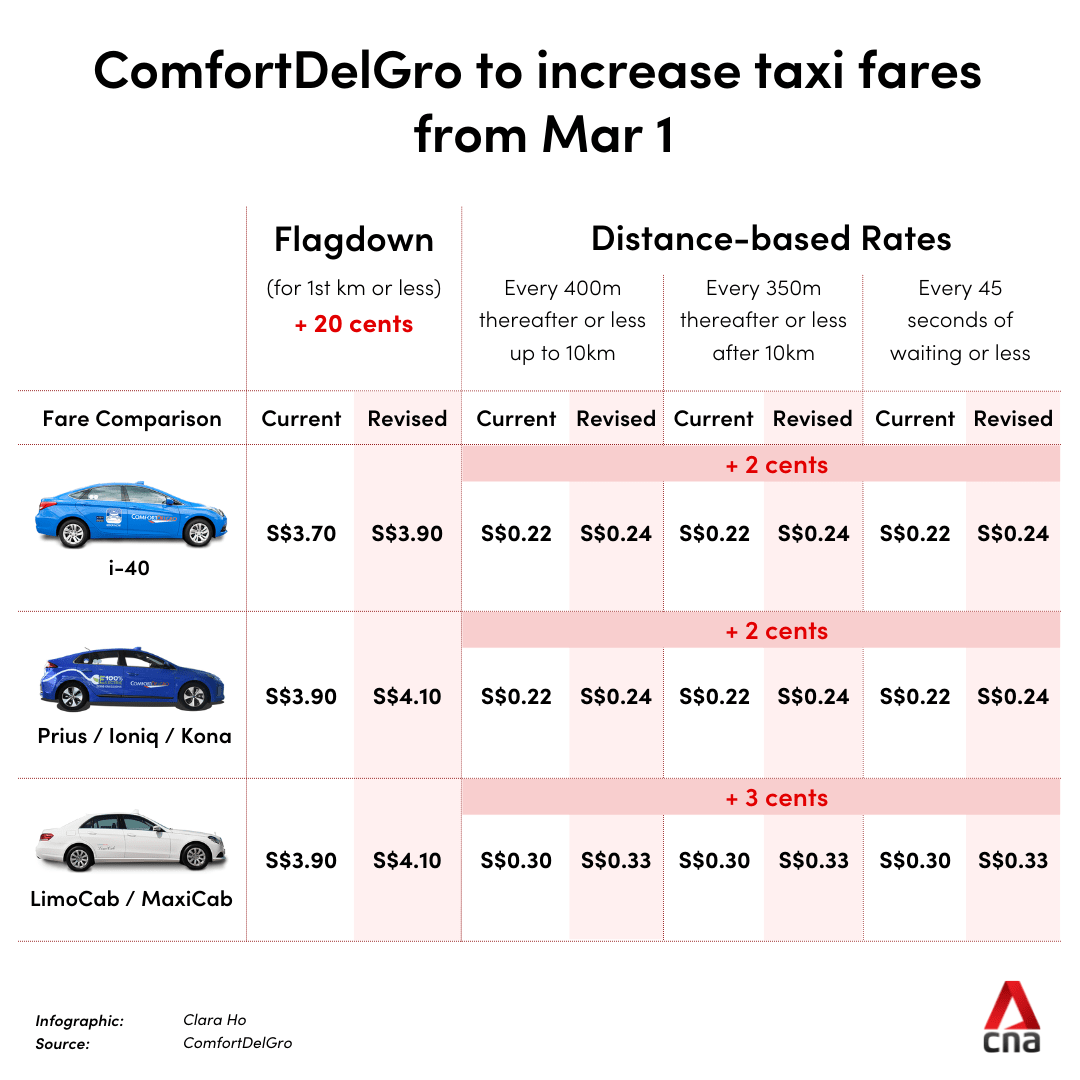ComfortDelGro to increase taxi fares from March; flagdown rate to go up by 20 cents
SINGAPORE: From March, passengers using ComfortDelGro taxi services will have to pay more in flagdown fares as well as distance-timed and waiting rates.
Flagdown fares across ComfortDelGro entire fleet of taxis will increase by 20 cents. This means that the flagdown fare of the Hyundai i-40 taxi will increase from S$3.70 to S$3.90.
The starting fare for Toyota Prius, Hyundai Ioniq, Kona as well as LimoCab and MaxiCabs will increase from S$3.90 to $4.10, said ComfortDelgro.
The new rates will take effect at 6am on Mar 1.
FIRST ADJUSTMENT IN A DECADE
As of December last year, ComfortDelgro operates more than 8,900 taxis under the Comfort and CityCab brands, making up about 60 per cent of Singapore's taxi population.
The fare increase - the first adjustment in a decade - is "necessary" to help cabbies defray higher operating costs, said ComfortDelGro in a media release.
"In the last six months alone, fuel prices have increased by about 10 per cent on average, in line with rising oil prices as world economies continue to emerge from the pandemic," it added.
"Inflation has also been heading north. In fact, in the last decade, inflation has grown by close to 12 per cent," it added.
Along with the increase in the flagdown fare, distance-timed and waiting rates will also rise.
For distance-timed rates, there will be a two-cent increase (from S$0.22 to S$0.24) for every 400m (or 350m after 10km) for normal taxis. Limousines will see a three-cent increase (from S$0.30 to S$0.33), said ComfortDelGro.
Likewise for waiting times, there will be a two-cent increase (from S$0.22 to S$0.24) for every 45 seconds of waiting time for normal taxis, and a three-cent increase (from S$0.30 to S$0.33) for limousines.
All other fare tariffs remain unchanged. With this adjustment, the estimated fare for a 10km off-peak normal taxi trip is expected to increase by 7.7 per cent or by S$0.84 - from S$10.98 to S$11.82.

TAXI DRIVERS' INCOME AFFECTED BY PANDEMIC
ComfortDelGro noted that the income of taxi drivers has been adversely impacted by the COVID-19 pandemic over the last two years, even with government relief and rental waivers.
"As a company, we have done the best we can to help them in the last two years, including extending daily rental waivers till now. With rising fuel costs and inflation, earnings of our cabbies have been hard hit. This fare adjustment will help our cabbies defray the higher costs of operation," said Mr Jackson Chia, CEO of ComfortDelGro’s Private Mobility Group and ComfortDelGro Taxi.
"Given that the last fare revision was more than a decade back, we seek the understanding and support of our commuters."
ComfortDelGro said it consulted the National Taxi Association (NTA) before proposing the changes and that NTA is supportive of the fare adjustment.
"Our taxi drivers have been working tirelessly to make ends meet especially over the past two years since the pandemic hit – grappling with low ridership numbers, increasing fuel costs and inflation," said Ms Yeo Wan Ling, adviser to NTA.
"We support the fare adjustments and hope that this move will help drivers better cope with rising costs," she added.
Meanwhile, the Public Transport Council (PTC) said that it has been informed of ComfortDelGro's intention to raise fares and has reminded the company to keep commuters informed of the new rates.
Taxi fares were last adjusted in December 2011, said ComfortDelGro.
Other taxi operators have indicated they may also adjust their fares.
“With higher fuel prices and inflation directly impacting our taxi partners’ operating costs and earnings, Strides Taxi is reviewing our current fare structure," said Mr Yeow How Pheng, the head of SMRT subsidiary Strides Mobility Services.
Prime Taxi deputy general manager Neo Chee Yong said the firm had already filed an application for its own fare adjustment, before ComfortDelGro made its announcement on Tuesday.
"We will take into account the new information and act accordingly. Our priority is to help drivers cope with increasing fuel costs, inflation and shrinking income," said Mr Neo, adding that more details would be provided at a later date.

















